#Elastic Compute Cloud (EC2)
Explore tagged Tumblr posts
Text
How to create an EC2 Instance
Amazon Elastic Compute Cloud (Amazon EC2) is a web service that provides secure, resizable computing capacity in the cloud. Amazon EC2 offers many options that help you build and run virtually any application. With these possibilities, getting started with EC2 is quick and easy to do. In this article, we shall discuss how to create an EC2 Instance. Please see the Various ways to restart an AWS…
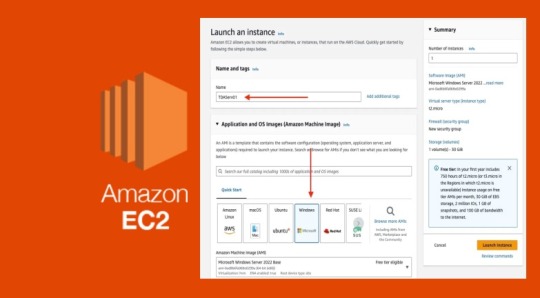
View On WordPress
#Amazon EC2#Amazon Elastic Compute Cloud#Amazon Web Services#AWS#EC2#EC2 instance#EC2 Instances#EC2 Launch#EC2Launch
0 notes
Text
Amazon Elastic Block Store, commonly known as EBS, is a significant component of Amazon Web Services (AWS) storage services, offering a versatile and reliable solution for managing data storage in the cloud. EBS allows users to create and attach block storage volumes to Amazon Elastic Compute Cloud (EC2) instances, making it an integral part of building scalable and high-performance applications on the AWS platform.
#amazon elastic block store#ebs#amazon web services#aws#ec2#amazon elastic compute cloud#cybersecurity#security#infosectrain#learntorise
0 notes
Text

code
#codeonedigest#cloud#aws#docker container#java#nodejs#javascript#docker image#dockerfile#docker file#ec2#ecs#elastic container service#elastic cloud computing#amazon ec2#amazon ecs#microservice#solid principle#python#kubernetes#salesforce#shopify#microservice design pattern#solid principles#java design pattern
0 notes
Text
CLOUD COMPUTING: A CONCEPT OF NEW ERA FOR DATA SCIENCE

Cloud Computing is the most interesting and evolving topic in computing in the recent decade. The concept of storing data or accessing software from another computer that you are not aware of seems to be confusing to many users. Most the people/organizations that use cloud computing on their daily basis claim that they do not understand the subject of cloud computing. But the concept of cloud computing is not as confusing as it sounds. Cloud Computing is a type of service where the computer resources are sent over a network. In simple words, the concept of cloud computing can be compared to the electricity supply that we daily use. We do not have to bother how the electricity is made and transported to our houses or we do not have to worry from where the electricity is coming from, all we do is just use it. The ideology behind the cloud computing is also the same: People/organizations can simply use it. This concept is a huge and major development of the decade in computing.
Cloud computing is a service that is provided to the user who can sit in one location and remotely access the data or software or program applications from another location. Usually, this process is done with the use of a web browser over a network i.e., in most cases over the internet. Nowadays browsers and the internet are easily usable on almost all the devices that people are using these days. If the user wants to access a file in his device and does not have the necessary software to access that file, then the user would take the help of cloud computing to access that file with the help of the internet.
Cloud computing provide over hundreds and thousands of services and one of the most used services of cloud computing is the cloud storage. All these services are accessible to the public throughout the globe and they do not require to have the software on their devices. The general public can access and utilize these services from the cloud with the help of the internet. These services will be free to an extent and then later the users will be billed for further usage. Few of the well-known cloud services that are drop box, Sugar Sync, Amazon Cloud Drive, Google Docs etc.
Finally, that the use of cloud services is not guaranteed let it be because of the technical problems or because the services go out of business. The example they have used is about the Mega upload, a service that was banned and closed by the government of U.S and the FBI for their illegal file sharing allegations. And due to this, they had to delete all the files in their storage and due to which the customers cannot get their files back from the storage.
Service Models Cloud Software as a Service Use the provider's applications running on a cloud infrastructure Accessible from various client devices through thin client interface such as a web browser Consumer does not manage or control the underlying cloud infrastructure including network, servers, operating systems, storage
Google Apps, Microsoft Office 365, Petrosoft, Onlive, GT Nexus, Marketo, Casengo, TradeCard, Rally Software, Salesforce, ExactTarget and CallidusCloud
Cloud Platform as a Service Cloud providers deliver a computing platform, typically including operating system, programming language execution environment, database, and web server Application developers can develop and run their software solutions on a cloud platform without the cost and complexity of buying and managing the underlying hardware and software layers
AWS Elastic Beanstalk, Cloud Foundry, Heroku, Force.com, Engine Yard, Mendix, OpenShift, Google App Engine, AppScale, Windows Azure Cloud Services, OrangeScape and Jelastic.
Cloud Infrastructure as a Service Cloud provider offers processing, storage, networks, and other fundamental computing resources Consumer is able to deploy and run arbitrary software, which can include operating systems and applications Amazon EC2, Google Compute Engine, HP Cloud, Joyent, Linode, NaviSite, Rackspace, Windows Azure, ReadySpace Cloud Services, and Internap Agile
Deployment Models Private Cloud: Cloud infrastructure is operated solely for an organization Community Cloud : Shared by several organizations and supports a specific community that has shared concerns Public Cloud: Cloud infrastructure is made available to the general public Hybrid Cloud: Cloud infrastructure is a composition of two or more clouds
Advantages of Cloud Computing • Improved performance • Better performance for large programs • Unlimited storage capacity and computing power • Reduced software costs • Universal document access • Just computer with internet connection is required • Instant software updates • No need to pay for or download an upgrade
Disadvantages of Cloud Computing • Requires a constant Internet connection • Does not work well with low-speed connections • Even with a fast connection, web-based applications can sometimes be slower than accessing a similar software program on your desktop PC • Everything about the program, from the interface to the current document, has to be sent back and forth from your computer to the computers in the cloud
About Rang Technologies: Headquartered in New Jersey, Rang Technologies has dedicated over a decade delivering innovative solutions and best talent to help businesses get the most out of the latest technologies in their digital transformation journey. Read More...
#CloudComputing#CloudTech#HybridCloud#ArtificialIntelligence#MachineLearning#Rangtechnologies#Ranghealthcare#Ranglifesciences
9 notes
·
View notes
Text
Exploring the Power of Amazon Web Services: Top AWS Services You Need to Know
In the ever-evolving realm of cloud computing, Amazon Web Services (AWS) has established itself as an undeniable force to be reckoned with. AWS's vast and diverse array of services has positioned it as a dominant player, catering to the evolving needs of businesses, startups, and individuals worldwide. Its popularity transcends boundaries, making it the preferred choice for a myriad of use cases, from startups launching their first web applications to established enterprises managing complex networks of services. This blog embarks on an exploratory journey into the boundless world of AWS, delving deep into some of its most sought-after and pivotal services.

As the digital landscape continues to expand, understanding these AWS services and their significance is pivotal, whether you're a seasoned cloud expert or someone taking the first steps in your cloud computing journey. Join us as we delve into the intricate web of AWS's top services and discover how they can shape the future of your cloud computing endeavors. From cloud novices to seasoned professionals, the AWS ecosystem holds the keys to innovation and transformation.
Amazon EC2 (Elastic Compute Cloud): The Foundation of Scalability At the core of AWS's capabilities is Amazon EC2, the Elastic Compute Cloud. EC2 provides resizable compute capacity in the cloud, allowing you to run virtual servers, commonly referred to as instances. These instances serve as the foundation for a multitude of AWS solutions, offering the scalability and flexibility required to meet diverse application and workload demands. Whether you're a startup launching your first web application or an enterprise managing a complex network of services, EC2 ensures that you have the computational resources you need, precisely when you need them.
Amazon S3 (Simple Storage Service): Secure, Scalable, and Cost-Effective Data Storage When it comes to storing and retrieving data, Amazon S3, the Simple Storage Service, stands as an indispensable tool in the AWS arsenal. S3 offers a scalable and highly durable object storage service that is designed for data security and cost-effectiveness. This service is the choice of businesses and individuals for storing a wide range of data, including media files, backups, and data archives. Its flexibility and reliability make it a prime choice for safeguarding your digital assets and ensuring they are readily accessible.
Amazon RDS (Relational Database Service): Streamlined Database Management Database management can be a complex task, but AWS simplifies it with Amazon RDS, the Relational Database Service. RDS automates many common database management tasks, including patching, backups, and scaling. It supports multiple database engines, including popular options like MySQL, PostgreSQL, and SQL Server. This service allows you to focus on your application while AWS handles the underlying database infrastructure. Whether you're building a content management system, an e-commerce platform, or a mobile app, RDS streamlines your database operations.
AWS Lambda: The Era of Serverless Computing Serverless computing has transformed the way applications are built and deployed, and AWS Lambda is at the forefront of this revolution. Lambda is a serverless compute service that enables you to run code without the need for server provisioning or management. It's the perfect solution for building serverless applications, microservices, and automating tasks. The unique pricing model ensures that you pay only for the compute time your code actually uses. This service empowers developers to focus on coding, knowing that AWS will handle the operational complexities behind the scenes.
Amazon DynamoDB: Low Latency, High Scalability NoSQL Database Amazon DynamoDB is a managed NoSQL database service that stands out for its low latency and exceptional scalability. It's a popular choice for applications with variable workloads, such as gaming platforms, IoT solutions, and real-time data processing systems. DynamoDB automatically scales to meet the demands of your applications, ensuring consistent, single-digit millisecond latency at any scale. Whether you're managing user profiles, session data, or real-time analytics, DynamoDB is designed to meet your performance needs.
Amazon VPC (Virtual Private Cloud): Tailored Networking for Security and Control Security and control over your cloud resources are paramount, and Amazon VPC (Virtual Private Cloud) empowers you to create isolated networks within the AWS cloud. This isolation enhances security and control, allowing you to define your network topology, configure routing, and manage access. VPC is the go-to solution for businesses and individuals who require a network environment that mirrors the security and control of traditional on-premises data centers.
Amazon SNS (Simple Notification Service): Seamless Communication Across Channels Effective communication is a cornerstone of modern applications, and Amazon SNS (Simple Notification Service) is designed to facilitate seamless communication across various channels. This fully managed messaging service enables you to send notifications to a distributed set of recipients, whether through email, SMS, or mobile devices. SNS is an essential component of applications that require real-time updates and notifications to keep users informed and engaged.
Amazon SQS (Simple Queue Service): Decoupling for Scalable Applications Decoupling components of a cloud application is crucial for scalability, and Amazon SQS (Simple Queue Service) is a fully managed message queuing service designed for this purpose. It ensures reliable and scalable communication between different parts of your application, helping you create systems that can handle varying workloads efficiently. SQS is a valuable tool for building robust, distributed applications that can adapt to changes in demand.
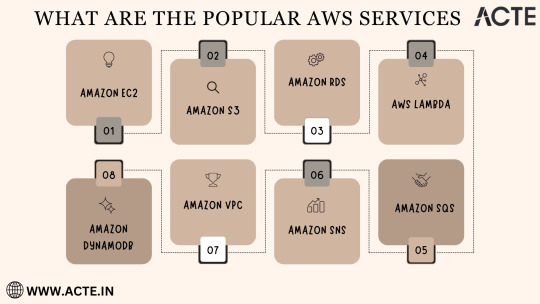
In the rapidly evolving landscape of cloud computing, Amazon Web Services (AWS) stands as a colossus, offering a diverse array of services that address the ever-evolving needs of businesses, startups, and individuals alike. AWS's popularity transcends industry boundaries, making it the go-to choice for a wide range of use cases, from startups launching their inaugural web applications to established enterprises managing intricate networks of services.
To unlock the full potential of these AWS services, gaining comprehensive knowledge and hands-on experience is key. ACTE Technologies, a renowned training provider, offers specialized AWS training programs designed to provide practical skills and in-depth understanding. These programs equip you with the tools needed to navigate and excel in the dynamic world of cloud computing.
With AWS services at your disposal, the possibilities are endless, and innovation knows no bounds. Join the ever-growing community of cloud professionals and enthusiasts, and empower yourself to shape the future of the digital landscape. ACTE Technologies is your trusted guide on this journey, providing the knowledge and support needed to thrive in the world of AWS and cloud computing.
8 notes
·
View notes
Text
Database Optimization that Led to 27% Cloud Cost Reduction for a Fintech Giant
About Customer
A leading digital financial services platform in India, serving over 50 million users with mobile recharges, bill payments, and digital wallet services, in the finance sector.digital wallet services

Problem Statement
AWS expenditure reached $150,000, necessitating significant cost optimization to ensure financial sustainability.
Inefficiencies in compute resources, storage, and database configurations led to increased operational costs and underutilized infrastructure.
Manual, repetitive infrastructure and database tasks consumed time and resources, reducing efficiency.
Unused resources, such as unattached EBS volumes, obsolete snapshots, and redundant load balancers, increased costs and cluttered the infrastructure.
Managing a large number of databases on both EC2 and RDS instances was complex and inefficient, requiring consolidation and optimization.
Outdated systems, such as MySQL 5.7, increased maintenance costs and lacked modern features, necessitating upgrades to improve performance and reduce support expenses.
Inadequate backup strategies and DR setups posed risks to data availability and resilience, potentially leading to data loss and extended downtimes.
[ Good Read: New age fintech platform achieves real-time fraud detection and scalable credit risk analysis with AWS ]
Solution Offered
Infrastructure Assessment: Conducted a detailed assessment of AWS infrastructure to identify bottlenecks and potential cost-saving opportunities. This involved analyzing compute resources, storage, database configurations, and service utilization.
DevOps DevOps Optimization:
Optimized S3 storage by deleting unused objects, implementing lifecycle policies for cheaper storage classes, and enabling versioning with cleanup policies.
Right-sized EC2 instances to match workload requirements and migrated from older Intel-based instances to newer AMD and Graviton instances for better performance at lower cost.
Conducted thorough cleanups of unused resources across multiple environments and accounts, including unattached EBS volumes, obsolete snapshots, and unused Elastic IPs.
Merged redundant load balancers to streamline traffic management and reduce associated costs.
Database Optimization:
RDS and EC2 Database Merging
Archival and Rightsizing
Database Migration
Upgrading Databases
Cost Reduction for Backups and DynamoDB
Final Outcomes
Significant Cost Savings
Enhanced Efficiency
Improved Performance
Increased Automation
Zero Downtime
You can check more info about: Database Optimization.
DevOps Consultant.
Cloud Data Manager.
Big Data Management.
Data Security Provider.
1 note
·
View note
Text
Brazil VPS Hosting: Quick & Inexpensive Virtual Private Servers
When it comes to finding quick and inexpensive Virtual Private Servers (VPS) hosting in Brazil, there are several providers you can consider. Here are a few options:
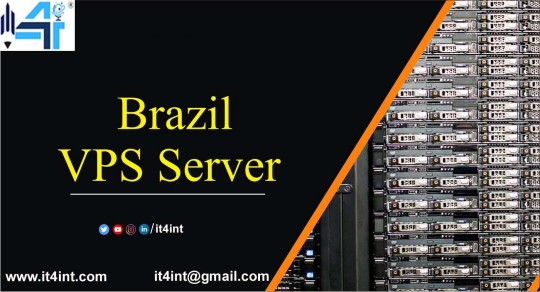
Hostinger: Hostinger offers VPS hosting with data centers in São Paulo, Brazil. They provide quick setup and competitive pricing for their VPS plans.
DigitalOcean: DigitalOcean has a data center in São Paulo, offering VPS hosting with SSD storage and a user-friendly interface for quick deployment.
Vultr: Vultr also has a presence in São Paulo and provides affordable VPS hosting with SSD storage, high-performance CPUs, and a range of data center locations globally.
Linode: Linode offers Brazil VPS hosting with a data center in São Paulo. They provide quick setup, SSD storage, and a variety of plans to choose from.
Amazon Web Services (AWS): AWS has a São Paulo region offering Elastic Compute Cloud (EC2) instances, which can be configured as VPS. While AWS may not always be the cheapest option, it provides scalability and reliability.
Before choosing a provider, consider factors such as server specifications, uptime guarantees, customer support quality, and scalability options. Additionally, make sure to check for any ongoing promotions or discounts that could help you save money on your VPS hosting.
#brazil windows vps#Brazil vps server pric#Best brazil vps server#buy vps server#Brazil vps price#VPS
2 notes
·
View notes
Text
Navigating the Cloud Landscape: Unleashing Amazon Web Services (AWS) Potential
In the ever-evolving tech landscape, businesses are in a constant quest for innovation, scalability, and operational optimization. Enter Amazon Web Services (AWS), a robust cloud computing juggernaut offering a versatile suite of services tailored to diverse business requirements. This blog explores the myriad applications of AWS across various sectors, providing a transformative journey through the cloud.
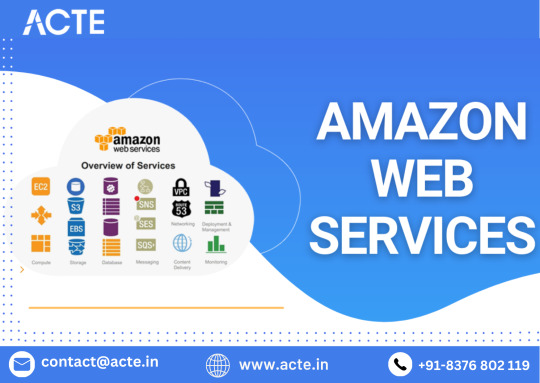
Harnessing Computational Agility with Amazon EC2
Central to the AWS ecosystem is Amazon EC2 (Elastic Compute Cloud), a pivotal player reshaping the cloud computing paradigm. Offering scalable virtual servers, EC2 empowers users to seamlessly run applications and manage computing resources. This adaptability enables businesses to dynamically adjust computational capacity, ensuring optimal performance and cost-effectiveness.
Redefining Storage Solutions
AWS addresses the critical need for scalable and secure storage through services such as Amazon S3 (Simple Storage Service) and Amazon EBS (Elastic Block Store). S3 acts as a dependable object storage solution for data backup, archiving, and content distribution. Meanwhile, EBS provides persistent block-level storage designed for EC2 instances, guaranteeing data integrity and accessibility.
Streamlined Database Management: Amazon RDS and DynamoDB
Database management undergoes a transformation with Amazon RDS, simplifying the setup, operation, and scaling of relational databases. Be it MySQL, PostgreSQL, or SQL Server, RDS provides a frictionless environment for managing diverse database workloads. For enthusiasts of NoSQL, Amazon DynamoDB steps in as a swift and flexible solution for document and key-value data storage.
Networking Mastery: Amazon VPC and Route 53
AWS empowers users to construct a virtual sanctuary for their resources through Amazon VPC (Virtual Private Cloud). This virtual network facilitates the launch of AWS resources within a user-defined space, enhancing security and control. Simultaneously, Amazon Route 53, a scalable DNS web service, ensures seamless routing of end-user requests to globally distributed endpoints.
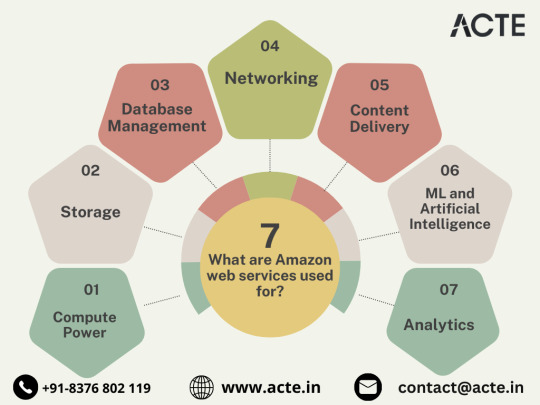
Global Content Delivery Excellence with Amazon CloudFront
Amazon CloudFront emerges as a dynamic content delivery network (CDN) service, securely delivering data, videos, applications, and APIs on a global scale. This ensures low latency and high transfer speeds, elevating user experiences across diverse geographical locations.
AI and ML Prowess Unleashed
AWS propels businesses into the future with advanced machine learning and artificial intelligence services. Amazon SageMaker, a fully managed service, enables developers to rapidly build, train, and deploy machine learning models. Additionally, Amazon Rekognition provides sophisticated image and video analysis, supporting applications in facial recognition, object detection, and content moderation.
Big Data Mastery: Amazon Redshift and Athena
For organizations grappling with massive datasets, AWS offers Amazon Redshift, a fully managed data warehouse service. It facilitates the execution of complex queries on large datasets, empowering informed decision-making. Simultaneously, Amazon Athena allows users to analyze data in Amazon S3 using standard SQL queries, unlocking invaluable insights.
In conclusion, Amazon Web Services (AWS) stands as an all-encompassing cloud computing platform, empowering businesses to innovate, scale, and optimize operations. From adaptable compute power and secure storage solutions to cutting-edge AI and ML capabilities, AWS serves as a robust foundation for organizations navigating the digital frontier. Embrace the limitless potential of cloud computing with AWS – where innovation knows no bounds.
3 notes
·
View notes
Text
Node and Pod Autoscaling in ROSA: Automating Performance at Scale
In today’s fast-paced digital landscape, performance and resource optimization are key. When running workloads on Red Hat OpenShift Service on AWS (ROSA), it becomes crucial to dynamically scale resources based on demand — both at the pod and node levels. This is where autoscaling shines.
This article explains how node and pod autoscaling works in a ROSA cluster and how it enables efficient, responsive applications without manual intervention.
🌐 What Is Autoscaling?
Autoscaling in Kubernetes/OpenShift is the ability to automatically adjust computing resources:
Pod Autoscaling scales your application pods based on CPU/memory usage or custom metrics.
Node Autoscaling adds/removes worker nodes depending on the resource requirements of pods.
In ROSA, these mechanisms are tightly integrated with AWS infrastructure and OpenShift’s orchestration engine.
📦 Pod Autoscaling with Horizontal Pod Autoscaler (HPA)
🔹 How It Works:
The Horizontal Pod Autoscaler (HPA) increases or decreases the number of pod replicas in a deployment based on real-time metrics.
🧠 Key Metrics Used:
CPU utilization (most common)
Memory usage
Custom metrics via Prometheus Adapter
✅ Example Scenario:
A web app receives sudden traffic spikes. The HPA detects high CPU usage and automatically scales from 3 to 10 pods, ensuring uninterrupted user experience.
🖥️ Node Autoscaling with Cluster Autoscaler
🔹 What It Does:
Cluster Autoscaler automatically adjusts the number of nodes in the ROSA cluster. When pods can't be scheduled due to lack of resources, it triggers the provisioning of new nodes.
🔸 Likewise, it removes underutilized nodes to reduce cost and resource waste.
🔧 Integrated with AWS:
ROSA uses Amazon EC2 Auto Scaling Groups behind the scenes.
Ensures nodes are provisioned using the same security, networking, and IAM policies.
⚙️ How to Configure Autoscaling in ROSA (Without Deep Coding)
While this blog avoids detailed CLI configuration, here’s a conceptual workflow:
1. Enable Cluster Autoscaler
Ensure ROSA is using machine pools or machine sets.
Enable autoscaling ranges (min/max node counts).
2. Deploy Your Application
Deploy a sample app using a Kubernetes/OpenShift deployment.
3. Enable Horizontal Pod Autoscaler
Define resource limits/requests in your pod spec (especially CPU).
Create an HPA object with threshold metrics.
4. Observe Autoscaling in Action
Use OpenShift Console or metrics dashboard to watch scale events.
During high load, see pods and nodes increase.
Once demand drops, resources scale back down.
📊 Benefits of Autoscaling in ROSA
✅ Optimized Resource Usage Only run what you need — scale down during off-peak hours.
✅ Performance Assurance Automatically meet SLAs by scaling up during peak loads.
✅ Cost Efficiency No need to overprovision resources. Pay only for what you use.
✅ Cloud-Native Resilience Elastic infrastructure aligned with cloud-native architecture principles.
📌 Final Thoughts
ROSA makes it simple to implement intelligent autoscaling strategies for both pods and nodes. By combining HPA and Cluster Autoscaler, you ensure that your application is highly available, cost-effective, and performance-optimized at all times.
As workloads grow and user demands fluctuate, autoscaling ensures your ROSA cluster remains lean, responsive, and production-ready.
For more info, Kindly follow: Hawkstack Technologies
0 notes
Text
Unlocking Innovation: How AWS Cloud Services Empower Modern Enterprises
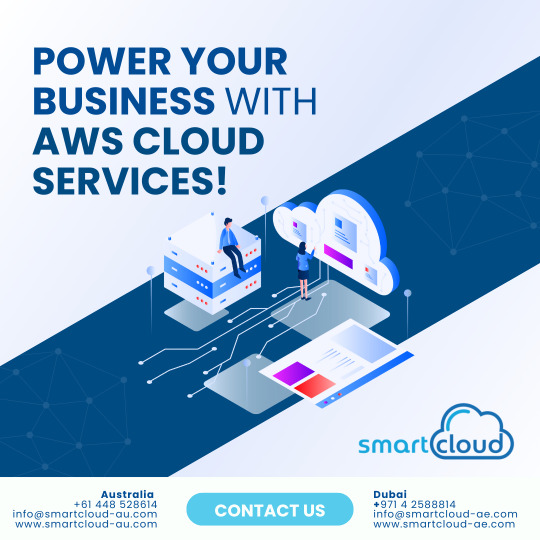
In today’s fast-paced, technology-driven world, innovation is no longer optional—it’s essential. Enterprises must continuously evolve to stay ahead of customer demands, market shifts, and disruptive competitors. One of the most powerful innovation enablers is cloud computing, and Amazon Web Services (AWS) stands at the forefront of this revolution. With its vast suite of cloud-based tools, infrastructure, and services, AWS empowers modern enterprises to scale faster, reduce costs, and experiment without limits.
This article explores how AWS cloud services unlock innovation across industries and why forward-thinking companies embrace AWS to transform their operations and drive sustainable growth.
The Innovation Imperative for Modern Enterprises
Growth, resilience, and competitive advantage are all fueled by innovation. However, traditional IT models are often slow, expensive, and rigid—barriers to the agility that innovation demands. Businesses tied to legacy infrastructure face long development cycles, limited scalability, and high maintenance costs.
Enter AWS Cloud Services, offering an agile, scalable, and cost-efficient alternative that enables enterprises to focus on building value rather than managing hardware.
What Makes AWS an Innovation Powerhouse?
1. Global Infrastructure and Scalability
AWS provides access to a global network of data centers in multiple Availability Zones and Regions. By deploying apps closer to customers, this infrastructure enables businesses to guarantee low latency, excellent performance, and worldwide scalability.
Businesses can scale up or down on demand—ideal for dynamic workloads and unpredictable user traffic. Whether it’s launching a new app, running a marketing campaign, or expanding globally, AWS offers instant computing power without upfront investment.
2. Agility and Speed to Market
Experimentation fosters innovation, and AWS makes it possible for quick prototyping, testing, and deployment. Developers can launch virtual servers in minutes, access pre-built services, and build minimum viable products (MVPs) faster than ever.
This speed-to-market advantage means companies can release features, gather feedback, and iterate quickly, turning ideas into market-ready solutions in record time.
3. Cost Efficiency and Pay-as-You-Go Pricing
Traditional IT infrastructure requires significant capital expenditure. However, AWS's pay-as-you-go pricing model enables businesses to only pay for the resources they use.
This not only reduces operational costs but also frees up resources to invest in innovation-focused projects. Now, entrepreneurs and small teams may use enterprise-grade technology without having to worry about the cost.
Core AWS Services That Drive Innovation
1. Amazon EC2 (Elastic Compute Cloud)
EC2 provides resizable virtual servers in the cloud. Businesses can run applications, host websites, or process large datasets without managing physical hardware.
It supports multiple operating systems and offers autoscaling to adjust resources based on demand, perfect for agile teams and high-growth environments.
2. Amazon S3 (Simple Storage Service)
S3 offers scalable, safe object storage for media content, analytics, data backup, and other uses. S3's 99.999999999% durability makes it the perfect choice for storing massive amounts of data that are essential for innovation and business insights.
3. AWS Lambda
Lambda enables serverless computing, allowing developers to run code in response to events without provisioning or managing servers. It’s a game-changer for building scalable, event-driven applications with minimal overhead.
4. Amazon RDS (Relational Database Service)
RDS makes database administration easier by automating patching, scalability, and backups. Businesses can focus on building better applications while AWS takes care of the underlying infrastructure.
5. AWS AI & Machine Learning Services
From Amazon SageMaker to Comprehend and Rekognition, AWS offers a robust suite of AI/ML tools that empower enterprises to integrate predictive analytics, natural language processing, and computer vision into their products, driving smarter decisions and personalized experiences.
How AWS Supports Digital Transformation
Digital transformation goes beyond adopting new technology—it’s about reimagining processes, culture, and customer experiences. AWS supports this journey by providing:
Migration Services to move from legacy systems to the cloud
DevOps tools like CodePipeline and CodeBuild for continuous integration and deployment
Security and compliance frameworks to meet regulatory standards
Analytics services like Redshift and QuickSight for data-driven insights
By combining these tools, enterprises can automate workflows, improve decision-making, and accelerate innovation at every level.
Industry-Specific Innovation with AWS
🚑 Healthcare
AWS supports HIPAA-compliant services for patient data management, AI-powered diagnostics, and telemedicine platforms, improving care delivery and operational efficiency.
🛒 Retail
Retailers use AWS for personalized shopping experiences, demand forecasting, and intelligent supply chains powered by real-time data.
🏦 Finance
Banks and fintech companies rely on AWS for secure transactions, fraud detection, risk analysis, and building agile digital platforms.
🏗️ Manufacturing
Manufacturers use AWS for predictive maintenance, smart factory solutions, and real-time supply chain visibility—transforming traditional operations into Industry 4.0 models.
The Security Advantage of AWS
Innovation must be secure, and AWS offers industry-leading security features, including:
Encryption at rest and in transit
Identity and access management (IAM)
Frequent certifications and audits of compliance (ISO, SOC, GDPR, etc.)
Dedicated security tools like AWS Shield and GuardDuty
With AWS, enterprises can innovate with confidence, knowing their data and operations are protected.
AWS Marketplace: Accelerate Innovation Through Third-Party Solutions
AWS Marketplace provides access to thousands of third-party software solutions, from CRM and cybersecurity to analytics and developer tools. Enterprises can quickly integrate these tools to expand capabilities and support niche innovation needs without long procurement cycles.
Final Thoughts: Why Choose AWS for Enterprise Innovation?
AWS is more than a cloud platform—it’s an innovation engine for modern enterprises. With its broad service offerings, scalable infrastructure, flexible pricing, and robust ecosystem, AWS gives businesses the tools to build, experiment, and grow in today’s digital economy.
Whether you’re a startup aiming to disrupt the market or an established enterprise transforming, AWS Cloud Services offer the speed, agility, and power to bring your boldest ideas to life.
#aws cloud service#aws services#aws security#aws web services#aws security services#AWS Consulting Partner#AWS experts#aws certified solutions architect
0 notes
Text
Mastering Cloud Efficiency with AWS DevOps Certification
AWS DevOps Certification is an excellent credential for cloud development and cloud operations practitioners who need to be experts in cloud development and operations using Amazon Web Services. As more businesses are shifting towards cloud computing, there has been an enormous demand for those who possess expertise in optimizing software development, automating infrastructure, and maximizing application performance. This certification is for such professionals who are well aware of the core DevOps and want to validate their ability to implement these practices in the AWS environments. It certifies your knowledge in automating software delivery pipelines, scaling infrastructure, and deploying highly resilient applications with the ability to manage the needs of today's business. With AWS DevOps Certification, you're not only demonstrating your technical expertise, but also your dedication to lifelong learning and cloud innovation.
AWS DevOps Certification offers a detailed tour of tools and services that enable organizations to achieve continuous integration and continuous delivery (CI/CD), scalable automation, and improved operational efficiency
The certification points out some of the important AWS tools such as CodePipeline, CodeDeploy, and CodeBuild to automate the deployment pipeline and CloudFormation and OpsWorks to automate infrastructure as code. Prospects should learn about monitoring applications using CloudWatch and centralized logging management using CloudTrail and other third-party solutions. Security control automation, governance, and compliance checking are strongly emphasized. The test assesses your skills in managing blue/green deployment, rolling deployments, fault tolerance, and disaster recovery planning. With complex cloud environments becoming the order of the day, AWS DevOps Certification professionals are better equipped to manage large-scale infrastructures with reliability and consistency in application delivery.
Getting the AWS DevOps Certification not only enhances your technical resume but also provides entry into well-paying cloud and DevOps jobs at leading companies worldwide
The students of this certification typically become DevOps Engineers, Cloud Architects, Site Reliability Engineers, and Automation Experts. These individuals earn high salaries and futuristic technology projects. Employers are also certain about the certification as a testament to your practical skills, in-knowledge application, and capacity to oversee intricate projects. It assures you are capable of designing and applying DevOps solutions that are able to satisfy technical and business needs. Certification is best suited for IT professionals who have over two years of experience managing an AWS environment and are familiar with new DevOps practices like continuous testing, configuration management, and elastic monitoring. With increasing organizations choosing microservices and containers, there's growing demand for certified DevOps practitioners integrating these technologies together into AWS pipelines.
Preparation for AWS DevOps Certification needs effort, hands-on experience, and sufficient information about AWS services and DevOps practices
Although not required, it is advisable that candidates possess the AWS Certified Developer – Associate or AWS Certified SysOps Administrator – Associate certification before taking the professional-level DevOps exam. AWS provides ample resources such as training manuals, whitepapers, practice tests, and documentation. Practice with real-world projects or simulations through tools such as EC2, Lambda, CloudWatch, and Elastic Beanstalk is one of the best practices. Practice with infrastructure automation through the use of CloudFormation scripts and creating CI/CD pipelines will provide the necessary confidence to write the exam and perform on-the-job work. Time management and knowledge of the topics covered in the exam—like monitoring, security, and incident response—are crucial to pass. Secondly, participating in online discussion forums or study groups can offer useful tips and insights regarding exams from experienced professionals.
Finally, AWS DevOps Certification is a wise investment for any IT professional seeking to future-proof their job and keep pace with today's world of cloud computing
The certification not only qualifies your technical expertise in AWS DevOps practices but also indicates your capability of designing efficient, secure, and scalable systems. As organizations continue to move their workloads to the cloud, certified DevOps engineers will be in high demand to lead automation, deployment, and infrastructure management efforts. Whether you are searching for a new career, seeking a promotion, or to lead cloud projects confidently, this certification will make you a standout in your profession. It's not just a credential—it's an investment in innovation, efficiency, and excellence in the cloud. Begin today and have AWS DevOps Certification as your next career advancement.
0 notes
Text
Cloud Computing Market Embraces Sustainability with Energy-Efficient Data Centers
Cloud Computing Market was valued at USD 605.3 billion in 2023 and is expected to reach USD 2619.2 billion by 2032, growing at a CAGR of 17.7% from 2024-2032.
Cloud Computing Market continues to witness remarkable momentum as enterprises globally transition toward scalable, on-demand digital infrastructure. Organizations across industries are increasingly adopting cloud-based services to drive efficiency, support hybrid workforces, and unlock innovation through advanced analytics and AI integration.
U.S. Leading Cloud Innovation with Scalable Enterprise Adoption
Cloud Computing Market is evolving with a strong focus on multi-cloud strategies, edge computing, and security-enhanced solutions. With businesses seeking agility and cost optimization, the cloud ecosystem is becoming central to digital transformation across both public and private sectors.
Get Sample Copy of This Report: https://www.snsinsider.com/sample-request/2779
Market Keyplayers:
Amazon Web Services (AWS) (EC2, S3)
Microsoft (Azure Virtual Machines, Azure Storage)
Google Cloud (Google Compute Engine, Google Kubernetes Engine)
IBM (IBM Cloud Private, IBM Cloud Kubernetes Service)
Oracle (Oracle Cloud Infrastructure, Oracle Autonomous Database)
Alibaba Cloud (Elastic Compute Service, Object Storage Service)
Salesforce (Salesforce Sales Cloud, Salesforce Service Cloud)
SAP (SAP HANA Enterprise Cloud, SAP Business Technology Platform)
VMware (VMware vCloud, VMware Cloud on AWS)
Rackspace (Rackspace Cloud Servers, Rackspace Cloud Files)
Dell Technologies (VMware Cloud Foundation, Virtustream Enterprise Cloud)
Hewlett Packard Enterprise (HPE) (HPE GreenLake, HPE Helion)
Tencent Cloud (Tencent Cloud Compute, Tencent Cloud Object Storage)
Adobe (Adobe Creative Cloud, Adobe Document Cloud)
Red Hat (OpenShift, Red Hat Cloud Infrastructure)
Cisco Systems (Cisco Webex Cloud, Cisco Intersight)
Fujitsu (Fujitsu Cloud Service K5, Fujitsu Cloud IaaS Trusted Public S5)
Huawei (Huawei Cloud ECS, Huawei Cloud OBS)
Workday (Workday Human Capital Management, Workday Financial Management)
Market Analysis
The cloud computing industry is experiencing rapid expansion fueled by the convergence of AI, big data, and IoT. Enterprises are migrating critical workloads to the cloud for greater flexibility, reduced IT overheads, and real-time data access. In the U.S., cloud infrastructure is being heavily utilized in finance, healthcare, and retail sectors, while European markets emphasize data sovereignty and compliance frameworks such as GDPR.
Cloud service providers are investing heavily in infrastructure upgrades, data center expansion, and region-specific availability zones to support rising demand. The growing reliance on cloud-native applications and the shift toward subscription-based models are reshaping operational frameworks and budget allocations.
Market Trends
Rise of hybrid and multi-cloud deployments for operational flexibility
Surge in AI and machine learning integration for advanced analytics
Expansion of edge computing to reduce latency and support IoT devices
Increased demand for cloud security and identity management solutions
Adoption of serverless computing for cost efficiency and scalability
Industry-specific cloud solutions in healthcare, finance, and government
Data localization and compliance-focused infrastructure in Europe
Access Complete Report: https://www.snsinsider.com/reports/cloud-computing-market-2779
Market Scope
The Cloud Computing Market offers vast opportunities as digital transformation accelerates across industries. From startups to global enterprises, cloud platforms are enabling faster innovation cycles and resilient operations.
Scalable infrastructure for dynamic business needs
Seamless integration of AI, automation, and analytics tools
Cost-effective deployment with pay-as-you-go models
Platform-as-a-Service (PaaS) and Software-as-a-Service (SaaS) dominance
Resilient backup, recovery, and disaster mitigation capabilities
Tailored cloud services supporting remote work and collaboration
Forecast Outlook
The cloud computing sector is poised for sustained growth as businesses move beyond traditional IT models. As demand for flexibility, performance, and global accessibility increases, cloud solutions will become even more integral to enterprise strategy. With continuous innovation in AI, quantum computing, and industry-specific cloud stacks, the next wave of growth will be defined by intelligent, decentralized, and secure architectures that support real-time decision-making and automation at scale.
Conclusion
The future of business is cloud-driven, and the Cloud Computing Market stands at the heart of this digital evolution. In a world where agility, resilience, and innovation are essential, cloud technology provides the foundation for sustainable growth. As U.S. enterprises lead global transformation and European markets prioritize trusted frameworks, cloud computing is no longer just an IT upgrade—it’s the strategic enabler of tomorrow’s competitive advantage.
About Us:
SNS Insider is one of the leading market research and consulting agencies that dominates the market research industry globally. Our company's aim is to give clients the knowledge they require in order to function in changing circumstances. In order to give you current, accurate market data, consumer insights, and opinions so that you can make decisions with confidence, we employ a variety of techniques, including surveys, video talks, and focus groups around the world.
Contact Us:
Jagney Dave - Vice President of Client Engagement
Phone: +1-315 636 4242 (US) | +44- 20 3290 5010 (UK)
Mail us: [email protected]
0 notes
Text
Journey to AWS Proficiency: Unveiling Core Services and Certification Paths
Amazon Web Services, often referred to as AWS, stands at the forefront of cloud technology and has revolutionized the way businesses and individuals leverage the power of the cloud. This blog serves as your comprehensive guide to understanding AWS, exploring its core services, and learning how to master this dynamic platform. From the fundamentals of cloud computing to the hands-on experience of AWS services, we'll cover it all. Additionally, we'll discuss the role of education and training, specifically highlighting the value of ACTE Technologies in nurturing your AWS skills, concluding with a mention of their AWS courses.

The Journey to AWS Proficiency:
1. Basics of Cloud Computing:
Getting Started: Before diving into AWS, it's crucial to understand the fundamentals of cloud computing. Begin by exploring the three primary service models: Infrastructure as a Service (IaaS), Platform as a Service (PaaS), and Software as a Service (SaaS). Gain a clear understanding of what cloud computing is and how it's transforming the IT landscape.
Key Concepts: Delve into the key concepts and advantages of cloud computing, such as scalability, flexibility, cost-effectiveness, and disaster recovery. Simultaneously, explore the potential challenges and drawbacks to get a comprehensive view of cloud technology.
2. AWS Core Services:
Elastic Compute Cloud (EC2): Start your AWS journey with Amazon EC2, which provides resizable compute capacity in the cloud. Learn how to create virtual servers, known as instances, and configure them to your specifications. Gain an understanding of the different instance types and how to deploy applications on EC2.
Simple Storage Service (S3): Explore Amazon S3, a secure and scalable storage service. Discover how to create buckets to store data and objects, configure permissions, and access data using a web interface or APIs.
Relational Database Service (RDS): Understand the importance of databases in cloud applications. Amazon RDS simplifies database management and maintenance. Learn how to set up, manage, and optimize RDS instances for your applications. Dive into database engines like MySQL, PostgreSQL, and more.
3. AWS Certification:
Certification Paths: AWS offers a range of certifications for cloud professionals, from foundational to professional levels. Consider enrolling in certification courses to validate your knowledge and expertise in AWS. AWS Certified Cloud Practitioner, AWS Certified Solutions Architect, and AWS Certified DevOps Engineer are some of the popular certifications to pursue.
Preparation: To prepare for AWS certifications, explore recommended study materials, practice exams, and official AWS training. ACTE Technologies, a reputable training institution, offers AWS certification training programs that can boost your confidence and readiness for the exams.
4. Hands-on Experience:
AWS Free Tier: Register for an AWS account and take advantage of the AWS Free Tier, which offers limited free access to various AWS services for 12 months. Practice creating instances, setting up S3 buckets, and exploring other services within the free tier. This hands-on experience is invaluable in gaining practical skills.
5. Online Courses and Tutorials:
Learning Platforms: Explore online learning platforms like Coursera, edX, Udemy, and LinkedIn Learning. These platforms offer a wide range of AWS courses taught by industry experts. They cover various AWS services, architecture, security, and best practices.
Official AWS Resources: AWS provides extensive online documentation, whitepapers, and tutorials. Their website is a goldmine of information for those looking to learn more about specific AWS services and how to use them effectively.
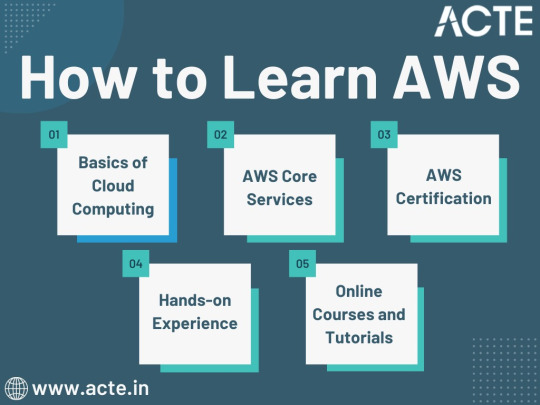
Amazon Web Services (AWS) represents an exciting frontier in the realm of cloud computing. As businesses and individuals increasingly rely on the cloud for innovation and scalability, AWS stands as a pivotal platform. The journey to AWS proficiency involves grasping fundamental cloud concepts, exploring core services, obtaining certifications, and acquiring practical experience. To expedite this process, online courses, tutorials, and structured training from renowned institutions like ACTE Technologies can be invaluable. ACTE Technologies' comprehensive AWS training programs provide hands-on experience, making your quest to master AWS more efficient and positioning you for a successful career in cloud technology.
8 notes
·
View notes
Text
AWS, Azure, and Google Cloud Comparison- Top 3 Differences

Introduction
Global cloud users are continually evaluating AWS, Azure and, Google Cloud comparison to determine the most suitable platform for specific business needs and operations. Though AWS is dominating the majority global cloud market share, Azure and Google Cloud Platform are rapidly closing the gap. Each cloud platform is equipped with robust computing capabilities, security intelligence, and flexible pricing plans to match specific business requirements.
Wondering which one is the best cloud match for your business? Dive in.
Top 3 differences between AWS, Azure, and Google Cloud
Here we present a comprehensive analysis among the top three cloud service providers in the world, for your better understanding-
Service area:
AWS
Provides services across 245+ nations and 33 regions
Azure
Accessible across 40 nations and 60 regions
Google Cloud
Provides services in nearly 200+ countries and 40 regions
Pricing:
AWS
Per-second-based pricing
Azure
Per-minute based pricing
Google Cloud
Per-minute based pricing
Computing:
AWS
Computing is done through EC2 (Elastic Compute Cloud)
Azure
Facilitates computing-on-demand with the creation of virtual machines
Google Cloud
Computing is done through GCP (Google Cloud Platform) & GCE (Google Compute Engine)
Key AWS Tools-
Gluon
DeepLens
Key Azure Tools-
Azure DevOps
Azure Monitor
Key GCP Tools-
Google Kubernetes Engine
Cloud Storage
Conclusion
Knowing about the major aws azure google cloud differences is essential to determine the best platform for your tailored business needs within budget. Whether you are a learner or a business owner, mastering major cloud functionalities and advantages is the key to unlocking limitless potential for your career and business. Register for DataSpace Academy’s popular cloud computing courses today.
#cloud computing courses#aws azure google cloud differences#aws azure google cloud comparison#AWS#Azure#Google Cloud#aws vs azure vs google cloud
0 notes
Text
Navigating the Cloud: Unleashing Amazon Web Services' (AWS) Impact on Digital Transformation
In the ever-evolving realm of technology, cloud computing stands as a transformative force, offering unparalleled flexibility, scalability, and cost-effectiveness. At the forefront of this paradigm shift is Amazon Web Services (AWS), a comprehensive cloud computing platform provided by Amazon.com. For those eager to elevate their proficiency in AWS, specialized training initiatives like AWS Training in Pune offer invaluable insights into maximizing the potential of AWS services.

Exploring AWS: A Catalyst for Digital Transformation
As we traverse the dynamic landscape of cloud computing, AWS emerges as a pivotal player, empowering businesses, individuals, and organizations to fully embrace the capabilities of the cloud. Let's delve into the multifaceted ways in which AWS is reshaping the digital landscape and providing a robust foundation for innovation.
Decoding the Heart of AWS
AWS in a Nutshell: Amazon Web Services serves as a robust cloud computing platform, delivering a diverse range of scalable and cost-effective services. Tailored to meet the needs of individual users and large enterprises alike, AWS acts as a gateway, unlocking the potential of the cloud for various applications.
Core Function of AWS: At its essence, AWS is designed to offer on-demand computing resources over the internet. This revolutionary approach eliminates the need for substantial upfront investments in hardware and infrastructure, providing users with seamless access to a myriad of services.
AWS Toolkit: Key Services Redefined
Empowering Scalable Computing: Through Elastic Compute Cloud (EC2) instances, AWS furnishes virtual servers, enabling users to dynamically scale computing resources based on demand. This adaptability is paramount for handling fluctuating workloads without the constraints of physical hardware.
Versatile Storage Solutions: AWS presents a spectrum of storage options, such as Amazon Simple Storage Service (S3) for object storage, Amazon Elastic Block Store (EBS) for block storage, and Amazon Glacier for long-term archival. These services deliver robust and scalable solutions to address diverse data storage needs.
Streamlining Database Services: Managed database services like Amazon Relational Database Service (RDS) and Amazon DynamoDB (NoSQL database) streamline efficient data storage and retrieval. AWS simplifies the intricacies of database management, ensuring both reliability and performance.
AI and Machine Learning Prowess: AWS empowers users with machine learning services, exemplified by Amazon SageMaker. This facilitates the seamless development, training, and deployment of machine learning models, opening new avenues for businesses integrating artificial intelligence into their applications. To master AWS intricacies, individuals can leverage the Best AWS Online Training for comprehensive insights.
In-Depth Analytics: Amazon Redshift and Amazon Athena play pivotal roles in analyzing vast datasets and extracting valuable insights. These services empower businesses to make informed, data-driven decisions, fostering innovation and sustainable growth.
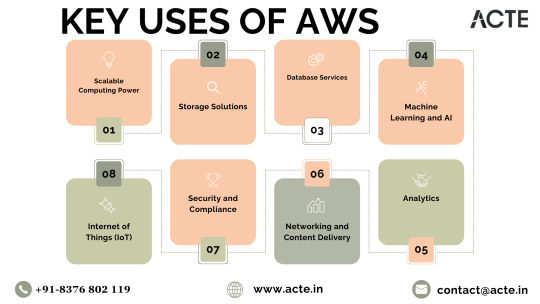
Networking and Content Delivery Excellence: AWS services, such as Amazon Virtual Private Cloud (VPC) for network isolation and Amazon CloudFront for content delivery, ensure low-latency access to resources. These features enhance the overall user experience in the digital realm.
Commitment to Security and Compliance: With an unwavering emphasis on security, AWS provides a comprehensive suite of services and features to fortify the protection of applications and data. Furthermore, AWS aligns with various industry standards and certifications, instilling confidence in users regarding data protection.
Championing the Internet of Things (IoT): AWS IoT services empower users to seamlessly connect and manage IoT devices, collect and analyze data, and implement IoT applications. This aligns seamlessly with the burgeoning trend of interconnected devices and the escalating importance of IoT across various industries.
Closing Thoughts: AWS, the Catalyst for Transformation
In conclusion, Amazon Web Services stands as a pioneering force, reshaping how businesses and individuals harness the power of the cloud. By providing a dynamic, scalable, and cost-effective infrastructure, AWS empowers users to redirect their focus towards innovation, unburdened by the complexities of managing hardware and infrastructure. As technology advances, AWS remains a stalwart, propelling diverse industries into a future brimming with endless possibilities. The journey into the cloud with AWS signifies more than just migration; it's a profound transformation, unlocking novel potentials and propelling organizations toward an era of perpetual innovation.
2 notes
·
View notes
Text
Price: [price_with_discount] (as of [price_update_date] - Details) [ad_1] Use Terraform and Jenkins to implement Infrastructure as Code and Pipeline as Code across multi-cloud environmentsKey FeaturesStep-by-step guidelines for managing infrastructure across multiple cloud platforms.Expert-led coverage on managing Pipeline as Code using Jenkins.Includes images demonstrating how to manage AWS and Azure resources using Terraform Modules.DescriptionThis book explains how to quickly learn and utilize Terraform to incorporate Infrastructure as Code into a continuous integration and continuous delivery pipeline. The book gives you the step-by-step instructions with screenshots and diagrams to make the learning more accessible and fun.This book discusses the necessity of Infrastructure as a Code (IaC) and the many tools available for implementing IaC. You will gain the knowledge of resource creation, IAM roles, EC2 instances, elastic load balancers, and building terraform scripts, among other learnings. Next, you will explore projects and use-cases for implementing DevOps concepts like Continuous Integration, Infrastructure as Code, and Continuous Delivery. Finally, you learn about the Terraform Modules and how to establish networks and Kubernetes clusters on various cloud providers. Installing and configuring Jenkins and SonarQube in Cloud Environments will also be discussed.As a result of reading this book, you will be able to apply Infrastructure as Code and Pipeline as Code principles to major cloud providers such as AWS and Azure.What you will learnCreate, manage, and maintain AWS and Microsoft Azure infrastructure.Using Packer, create AMIs and EC2 instances.Utilize Terraform Modules to create VPC and Kubernetes clusters.Put the Pipeline and Infrastructure as Code principles into practice.Utilize Jenkins to automate the application lifecycle management process.Who this book is forThis book will primarily help DevOps, Cloud Operations, Agile teams, Cloud Native Developers, and Networking Professionals. Being familiar with the fundamentals of Cloud Computing and DevOps will be beneficial.Table of Contents1. Setting up Terraform2. Terraform Basics and Configuration3. Terraform Provisioners4. Automating Infrastructure Deployments in the AWS Using Terraform5. Automating Infrastructure Deployments in Azure Using Terraform6. Terraform Modules7. Terraform Cloud8. Terraform and Jenkins Integration9. End-to-End Application Management using TerraformRead more Publisher : Bpb Publications (16 June 2022) Language : English Paperback : 468 pages ISBN-10 : 935551090X ISBN-13 : 978-9355510907 Reading age : 18 years and up Item Weight : 798 g Dimensions : 19.05 x 2.69 x 23.5 cm Country of Origin : India
Net Quantity : 1.0 Count [ad_2]
0 notes